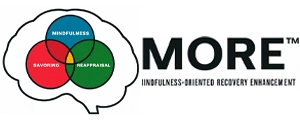M.O.R.E Therapy Training
$895.00
Mindfulness-Oriented Recovery Enhancement (MORE) is an evidence-based therapy, supported by more than 16 clinical trials and over $90 million in federal research grants (e.g., NIH, DOD), that unites innovative mindfulness, reappraisal, and savoring techniques — rooted in mindfulness meditation, “third wave” cognitive-behavioral therapy, and principles from positive psychology — into an integrative, unique, and sequenced mind-body treatment approach. Eric Garland, PhD, LCSW developed MORE by translating fundamental discoveries from cognitive and affective neuroscience into targeted therapeutic strategies that reduce addictive behavior, emotional distress, and chronic pain, while simultaneously increasing healthy pleasure, joy, and meaning in life. MORE has been shown to be nearly three times as effective as standard therapy for treating addiction and chronic pain.
Description
Delivered through our intuitive Learning Management System (LMS), this self-paced, on-demand course equips clinicians with the core competencies of the MORE protocol—an evidence-based, neuroscience-informed approach to treating addiction, emotional distress, and chronic pain. Through a blend of didactic instruction and experiential learning, you’ll master unique mind-body therapy techniques, advanced cognitive-behavioral skills, and strategies from positive psychology to enhance emotion regulation, self-control, and resilience. The course includes a deep dive into the theoretical foundations of MORE, supported by the latest research in mindfulness, neuroplasticity, and affective science. Clinical role plays and guided demonstrations bring the treatment manual to life, allowing you to observe and practice the techniques in real-world scenarios. Whether you’re new to mindfulness-based therapy or looking to expand your clinical toolkit, this training offers practical, research-backed methods to elevate your care.
Specialized Clinical Application Tracks: Tailored Training for Complex Conditions
In addition to the core MORE training, you’ll gain access to two in-depth clinical application tracks designed to help you apply the MORE protocol with precision and confidence in high-impact clinical settings:
- Addiction to Illicit Drugs and Alcohol
- Chronic Pain and Opioid Use
Each track offers a step-by-step guide to implementing MORE for these specific populations, consistent with the published MORE treatment manuals (Garland, 2013; Garland, 2024), including detailed instruction on therapeutic sequencing, clinical decision-making, and the nuanced language that fosters engagement and change. You’ll learn how to adapt the protocol to meet the unique psychological and physiological needs of individuals struggling with substance use and/or chronic pain—while maintaining fidelity to the evidence-based framework. These tracks also explore targeted strategies for enhancing motivation, alleviating symptoms, and promoting self-regulation, all grounded in the latest neuroscience and behavioral research.
Whether you’re working in outpatient settings, integrated health systems, addiction treatment programs, or primary care, these clinical application tracks provide the tools to deliver MORE with clarity, compassion, and measurable impact.
LMS Features and basic course sales:
-
- interactive courses with professional video
- certification on completion with met standards
- high quality, interactive online learning experience
- accessible and affordable high-quality professional development
- course features interactive elements and video to keep learners engaged
- curated learning program that fits your personal goals and business needs
- learn skills that will help you get ahead of the competition
- interactive exercises, downloadable resources, knowledge checks, and gamification
- meaningful and exciting learning experience
- we’ve crafted an engaging learning journey with interactive elements and scenario based learning
- learning on the go with the flexibility to take courses on a desktop, laptop, tablet, or mobile device
Interactive Learning Experience
Courses emphasize engagement through interactive video, knowledge checks, and scenarios, allowing learners to interact directly with content, keeping them actively participating rather than passively watching.
Mobile-Optimized Learning
The platform provides a responsive design that works seamlessly across devices, enabling learners to access courses anytime, anywhere. This flexibility is crucial for busy professionals who need to learn on the go.
Certificate and Credentialing
Courses offer certificates upon completion, providing tangible proof of learning achievements that can enhance professional credentials and career prospects.
Rich Content Variety
Courses include professional video, animation, PDFs, quizzes, knowledge checks, and interactive assignments, catering to different learning styles and preferences.




